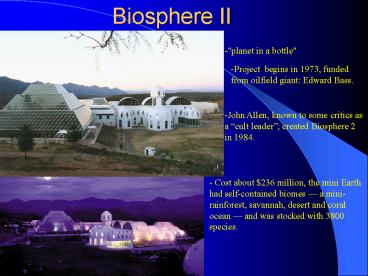Biosphere II - PowerPoint PPT Presentation
1 / 14
Title:
Biosphere II
Description:
Solar chimney to move air upward. -solar energy to provide hot water.Entire roof is solar collector and heats water. It s passed through a heat exchanger in the ... – PowerPoint PPT presentation
Number of Views:91
Avg rating:3.0/5.0
Title: Biosphere II
1
Biosphere II
-"planet in a bottle"
-Project begins in 1973, funded from oilfield
giant Edward Bass.
-John Allen, known to some critics as a cult
leader, created Biosphere 2 in 1984.
- Cost about 236 million, the mini Earth had
self-contained biomes a mini-rainforest,
savannah, desert and coral ocean and was
stocked with 3800 species.
2
Map of Biosphere II
3
Biosphere II
- 4 men and 4 women entered on September 26, 1991
for two years. - Many problems infestation of ants and morning
glories collapse of many animals populations,
including honey bees and humming birds. - Crops failed, O2 levels decreased and CO2 levels
increased due to oxygen-using bacteria produced
from organic composting. - Social problems team split into 2 groups and
hoarded food. However, they managed to stay
entire 2 years. - 6 months later, a second crew entered, but again,
social problems occurred. Two members were
arrested for a protest against a change in
management in which they opened the sealed
enclosure to let in outside air.
4
Biosphere II-today
- Columbia university took it in 1996, changed it
into a more campus-like facility. - Project change from survivability to
sustainability. - Scientists were allowed to come in a study, until
1996, when Columbia pulled out. - Now, it is now a tourist attraction.
5
Living Space
6
Water
-900,000-gallon ocean
7
Sky City- Japan
http//dsc.discovery.com/convergence/engineering/s
kycity/interactive/interactive.html
-Japanese architects approach to urban crowding
living in the sky, a skyscraper that would house,
entertain and employ hundreds of thousands of
people. Can it be done?
8
Ostratornskolan, Lund, Sweden Building ecology
first principles for a sustainable built
environmentby Peter Graham
- School designed using eco-cycles, relationship
between building and the social, economic, and
environment at each of its life-cycle phases.
p.241 - Adhere to laws and principles of ecologically
sustainable building, and takes advantage of the
effectiveness of natural systems. p. 241 - Create systems that consume max energy-quality.
p.255 - Use energy in a large number of small steps, not
is a small number of large steps. p. 255 - Minimize waste, consume resources no faster than
the rate at which nature can replenish them. p.
256
9
Examples of Reusing and Recycling
- Use of 22 secondhand windows and 200,000 bricks.
- Use of crushed concrete and brick as aggregate,
base-course, drainage, and foot paths. - Designing few layers in the structures.
- Using no composite materials
- Use of durable, easy-to-maintain materials.
10
The Food Eco-Cycle
-food grown is stored in an on-site earth cellar
that maintains a constantly cool year-round
temperature.
-food and food-related waste is reused and
recycled. Non-biodegradable materials used in
cooking, serving food. Food comes from local
farmer
11
Energy Eco-cycle
-use of shade from facades, natural light, and
low-energy light fittings to minimize heat.
-subsurface air used to heat air in winter, and
cool in summer. Solar chimney to move air upward.
12
Solar Energy
-solar energy to provide hot water.Entire roof is
solar collector and heats water. Its passed
through a heat exchanger in the basement to heat
water for use.
-Energy is in the system longer and reduces need
to purchare energy for heating water.
13
Eco-water Cycle
-rainwater is toilet water. Two separate holding
tanksone for urine, the other for feces. After
fermentation, sold as fertilizer to local farmer.
-grey water is used for basins and showers,
filtrated in root zone.
14
References
- Highfield,R. (January 23, 2004) Trouble in the
bio bubble. The Age. Retrieved January 25, 2004.
http//www.theage.com.au/articles/2004/01/22/10747
32535189.html - Extreme Engineering Living in the Sky.
http//dsc.discovery.com/convergence/engineering/s
kycity/interactive/interactive.html - Graham, P. (2003). Building ecology first
principles for a sustainable built
environment.Melbourne Blackwell Science.































